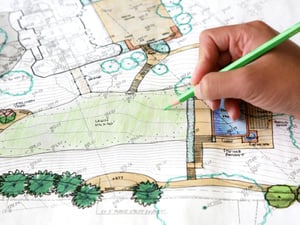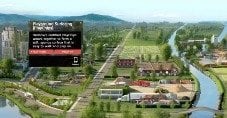As the Metro Vancouver population grows, so will the demand for clean water. The result is that we all need to become wiser in the way we use our water. Each household can take steps to reduce its water consumption, and in the process help reduce the costs associated with increasing water supply and storage capacity. The City of Vancouver undertakes a wide range of related projects each year, from education to infrastructure replacement to distribution main flushing.

Water wise landscapes are gardens or outdoor areas that use less water. Any landscape design can be water wise - formal, traditional, or modern.
Vancouver's water wise landscape guidelines provide ideas for a wide range of landscapes (single family homes, multi-unit residences, commercial properties), to help reduce the use of clean, drinkable water for irrigation, while maintaining the quality of our urban landscape.
Why be water wise?
Demand on the city's water supply is increasing, but our supply is not. This creates a water shortage during the summer, when irrigation demands and other activities like car washing are at their highest.
Water wise landscapes help to:
- Preserve water quality and availability
- Create healthy ecological environments
- Increase plant life
- Reduce the urban heat island effect (urban areas are warmer than rural areas)
- Reduce greenhouse gas emissions
- Reduce maintenance efforts and costs
- Reduce strain on the local infrastructure
What the water wise guidelines include:
These guidelines provide practical advice on how to:
- Create more planted areas
- Reduce the use of clean drinking water for gardening
- Create spaces that are sustainable and enjoyable
- Build it to last
Water Wise Landscape Principles
Planning a series of incremental water reduction strategies is the best way to achieve larger overall reductions. For example, planning for a naturalized garden design with adaptive plant species can attract birds and insects and reduce main tenance, and also will thrive with minimal watering (once established). Other examples include: letting grass go dormant during the summer, amending soils and applying mulch.

Where possible, find alternatives to using potable tap water for irrigation purposes. It is better to water less frequently and deeply than to water everyday. To reduce water loss via evaporation, water gardens and lawns in the early morning.
Healthy soils create healthy landscapes. They absorb water easily, retain moisture, and drain well. Ensure proper depths, amend regularly, and limit or eliminate the use of synthetic chemicals. Use mulch to prevent soil water loss through evaporation from sun and wind exposure.
Before designing or planting a landscape, research the suitable growing conditions and growth habit of plants. Consider how plants relate to each other spatially and through time when combined in groups. Through layering trees, shrubs, vines and groundcovers, biodiversity and structural diversity can be increased. Layered foliage also intercepts rainfall and reduces water volumes that would normally flow into stormwater systems. For smaller projects, consult plant books, gardening stores or local plant information sources. For larger projects, it is
recommended that a landscape designer or professional be consulted.
Absorbent and permeable landscapes allow water to infiltrate the ground, reducing runoff and filtering and storing water in the soil. Consider contouring softscapes to resemble a soft dish to encourage infiltration, and install permeable paving for hardscape areas. Rainwater can be directed to planted areas for absorption by the soil and plant roots.
Source: City of Vancouver "Water Wise Landscape Guidelines" Download the full comprehensive guide for more information and detailed suggestions for planning water wise landscaping.




